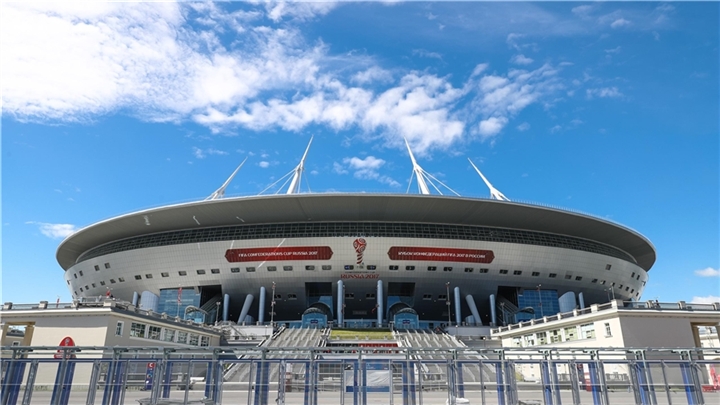
Russia’s invasion of Ukraine has created serious concerns across Europe. Since Wednesday night’s attack, a handful of countries, organizations and athletes have called to impose sanctions and cancel major sports events Russia was due to host.
The latest organization to react is UEFA. European soccer’s governing body has decided to move this year’s Champions League final that was scheduled for May 28 in Gazprom Stadium, home of Zenit Saint Petersburg, to Paris.
Formula One followed suit and has announced that the Soshi Grand Prix that was supposed to be held in September has been canceled. Four-time F1 champion Sebastian Vettel had already said he wouldn’t participate and called for a wider boycott.
Europe’s top basketball league, the Turkish Airlines Euroleague, has postponed one of its marquee games, a showdown this Sunday between Barcelona and CKSA Moscow in Moscow. The announcement came after Barcelona decided not to fly to the Russian Federation.
Next week’s ATP Challenger tennis tournament in Moscow has been canceled following concerns over player safety.
The reactions and the associated monetary impact will likely grow. According to Conrad Wiacek, the head of sports analysis at GlobalData, approximately $500 million in sports sponsorship and event agreements are at risk.
“Decision-makers within sports, not just in Europe, but across the world are engaging in partnerships without sufficient due diligence,” said Simon Chadwick, director of the Centre for Eurasian Sport, Emlyon Business School. “But also without sufficient risk assessment. And we’re not just talking about risk assessment in commercial terms or in economic terms, but as we’ve now seen through this episode, geopolitical risk assessment. Call it naivety, and I would more rudely call this ignorance within sport. Or maybe it’s just blindness.”
On Friday, Manchester United, owned by the U.S.-based Glazer family, terminated its sponsorship deal with the Russian national airline, Aeroflot. Thursday, one of Germany’s biggest soccer clubs, Schalke 04, removed Gazprom’s logo from the team’s shirts. The team’s deal with Russian oil company has been in place since 2007 and carries a reported value of $30 million a year. (The club declined to comment.) Gazprom has been one of UEFA’s top sponsors, supplying $60 million a year since 2013 in a deal that is supposed to continue until 2024. “Moving the final away from Saint Petersburg could put one of UEFA’s highest-grossing, but most controversial, partnerships under threat,” Wiacek said.
FIFA is also under pressure regarding Russia’s World Cup participation. Poland, the Czech Republic and Sweden announced that they will not travel to Russia for scheduled qualifiers. The Ukrainian Football Association also called for Russia to be expelled from both the UEFA club and FIFA World Cup competitions.
“European football has been sleepwalking into this,” said Chadwick. “And this is really, for me, it's a reflection of European football's obsession with money.”
Elsewhere in Formula One, Haas has announced it will remove the branding of title sponsor Uralkali ahead of the final day of preseason testing on Friday. Uralkali, a Russian potash fertilizer producer and exporter, is part-owned by the father of Haas driver Nikita Mazepin.
In addition to the now-canceled Champions League final, Russia is due to host UEFA Super Cup in 2023, the European Rhythmic Gymnastics Championships in 2023 and the European Curling Championships later this year. Those could all be moved in the coming days.
|